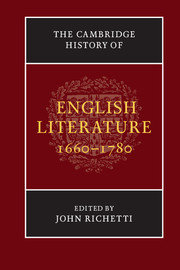Book contents
- Frontmatter
- Introduction
- PART I LITERARY PRODUCTION AND DISSEMINATION: CHANGING AUDIENCES AND EMERGING MEDIA
- PART II LITERARY GENRES: ADAPTATION AND REFORMATION
- 5 Restoration and early eighteenth-century drama
- 6 Dryden and the poetic career
- 7 Political, satirical, didactic and lyric poetry (I): from the Restoration to the death of Pope
- 8 Eighteenth-century women poets
- 9 Systems satire: Swift.com
- 10 Persistence, adaptations and transformations in pastoral and Georgic poetry
- 11 Political, satirical, didactic and lyric poetry (II): after Pope
- 12 Drama and theatre in the mid and later eighteenth century
- 13 Scottish poetry and regional literary expression
- PART III LITERATURE AND INTELLECTUAL LIFE: THE PRODUCTION AND TRANSMISSION OF CULTURE
- PART IV LITERATURE AND SOCIAL AND INSTITUTIONAL CHANGE
- PART V LITERARY GENRES: TRANSFORMATION AND NEW FORMS OF EXPRESSIVENESS
- PART VI CONCLUSION
- Chronology
- Bibliographies
- Index
- References
10 - Persistence, adaptations and transformations in pastoral and Georgic poetry
from PART II - LITERARY GENRES: ADAPTATION AND REFORMATION
Published online by Cambridge University Press: 28 March 2008
- Frontmatter
- Introduction
- PART I LITERARY PRODUCTION AND DISSEMINATION: CHANGING AUDIENCES AND EMERGING MEDIA
- PART II LITERARY GENRES: ADAPTATION AND REFORMATION
- 5 Restoration and early eighteenth-century drama
- 6 Dryden and the poetic career
- 7 Political, satirical, didactic and lyric poetry (I): from the Restoration to the death of Pope
- 8 Eighteenth-century women poets
- 9 Systems satire: Swift.com
- 10 Persistence, adaptations and transformations in pastoral and Georgic poetry
- 11 Political, satirical, didactic and lyric poetry (II): after Pope
- 12 Drama and theatre in the mid and later eighteenth century
- 13 Scottish poetry and regional literary expression
- PART III LITERATURE AND INTELLECTUAL LIFE: THE PRODUCTION AND TRANSMISSION OF CULTURE
- PART IV LITERATURE AND SOCIAL AND INSTITUTIONAL CHANGE
- PART V LITERARY GENRES: TRANSFORMATION AND NEW FORMS OF EXPRESSIVENESS
- PART VI CONCLUSION
- Chronology
- Bibliographies
- Index
- References
Summary
Thomas Parnell's lines about the pastoral world take us to the heart of an age-old problem. ‘Oft have I read’, he begins, ‘that Innocence retreats / Where cooling streams salute the summer Seats; / Singing at ease she roves the field of flowers / Or safe with shepherds lies among the bowers …’ Having passed through a country fair, however, he had found ‘No Strephon nor Dorinda’, but a motley crew of randy, idle and drunken rustics:
Are these the Virtues which adorn the plain?
Ye bards forsake your old Arcadian Vein,
To sheep, those tender Innocents, resign
The place where swains and nymphs are said to shine;
Swains twice as wicked, Nymphs but half as sage.
Tis sheep alone retrieve the golden age.
Where is pastoral innocence to be found? And how can any modern writer not view Arcadia ironically? By a shift of focus typical of early eighteenth-century satire, the sheep move centre-stage: the incidentals of pastoral become the guardians of its soul. The poet is self-consciously listening to his own bland rhetoric (‘the Virtues which adorn the plain’, etc.) before the final rueful comment emerges – conclusive, yet almost in parenthesis, as if he is turning away from the scene. After two thousand years of pastoral poetry Parnell (d. 1718) can find only one unsullied image remaining, and there seems no more to be said.
- Type
- Chapter
- Information
- The Cambridge History of English Literature, 1660–1780 , pp. 259 - 286Publisher: Cambridge University PressPrint publication year: 2005
References
- 2
- Cited by



